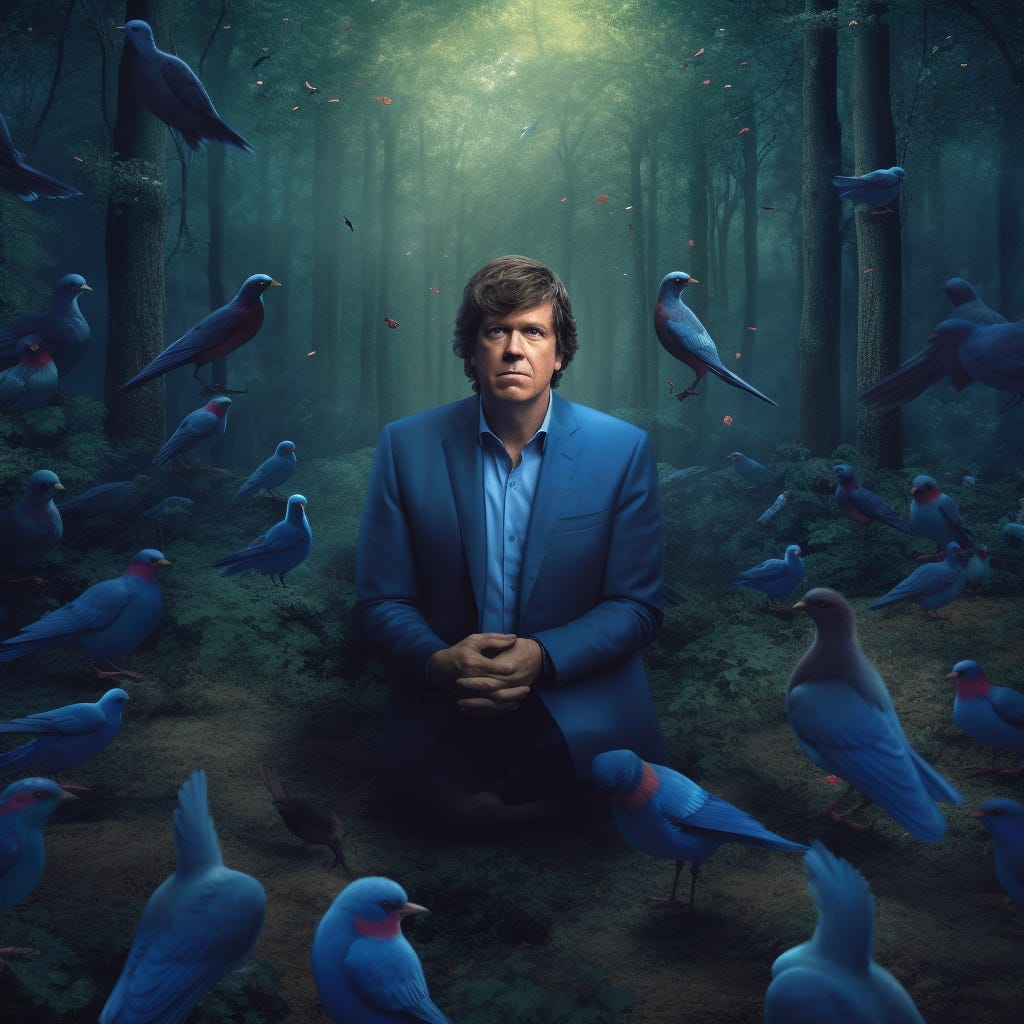Tucker Carlson is a success on Twitter (even if his numbers are BS)
We are the last generation to believe that a popular cable host jumping to the internet is a demotion.
Tucker Carlson is on Twitter. Aren’t we all?
But is that a good or a bad thing for the Carlson’s new distilled brand of polemics?
The Carlson Stans rejoiced last week when their jilted champion made his Twitter debut. At 115 million views, his first episode about the shifting definition of the truth in society appears to be an out of the box hit. His follow up about the shifting definition of truth in society sits at 50 million as I write this. One might also assume that his episode debuting Tuesday about the Trump indictment (and how it reflects the shifting definition of truth in society) will do big numbers as well.
Not so fast says Mediate. View counts on internet platforms are hugely unreliable.
So are the numbers cooked? Is believing that Carlson is more powerful on Twitter simply copium?
Only two things truly matter in media: money and influence. The ability to have capital to expand your team and sway minds is the ultimate measure of success. Does Carlson have a winning formula to do so? Maybe! But what is clear is that the platform he left has rapidly vanishing influence beyond this election.
Let’s start with influence.
Are Twitter viewing statistics reliable? No. All online viewing metrics are fraudulent in one way or another. Videos with anemic view counts aren’t watched as much as those with some traction. This leads to sites like Facebook and Twitter to make the bar for something to count as a “view” ludicrously low. Facebook faced a lawsuit for it.
So should we take the Nielsen's television rating system as the golden standard? No. The ratings authority lost their accreditation after their numbers failed to represent an increase in viewers during quarantine. They only regained it in April of this year.
And if you’d indulge me on a conspiracy theory, if there was ever a reason to cook the books it would be to prop up the industry it largely makes it’s money from: broadcast and cable television. One might call it yet another example of… the shifting definition of truth in society.
Let's not forget the other side of the coin: money.
A few weeks ago I did a Politics Politics Politics episode about Tucker’s ejection from Fox and his career options in the feral world of internet content. The clear comparisons for him would be Glenn Beck (who also left Fox News) or The Daily Wire. Both are geared toward the conservative demo and both make their money primarily on subscriptions.
With a paywall model, there's no doubt that Carlson could make more money for himself and his staff. Even at the rumored $15 to $20 million a year salary he drew from Fox. A 2020 report on Beck’s The Blaze had their subscriber count at 450,000 paying $102 on average which would come before any kind of brand deals or advertising.
While Beck has been the gold standard in pivoting from television to internet, there is no reason to believe Carlson couldn’t do something similar.
What’s more is he's no longer beholden to two masters: cable executives and the health of the cable industry. The former has attempted to kneecap his career before a presidential cycle when attention on his program would be at its highest and the latter is a slow motion train wreck.
It’s the fight with his old employer that most defines Carlson’s current move. When Twitter CEO Elon Musk first announced Carlson’s new show he was quick to mention that Twitter was not paying him for exclusivity. This was deliberate. Twitter is merely a waypoint in Carlson's journey. His real goal appears to be forcing a legal settlement with his old bosses.
Fox News has sent Carlson a cease-and-desist letter in response to the new Twitter show. While Carlson is off the air he’s still getting paid by Fox and they believe that buys them his exclusivity. His contract ends after the 2024 election, meaning if he obeyed it he’d be cooled off during the busiest time of his profession.
A ratcheted up legal battle is exactly what Carlson wants, otherwise he’d have to simply sit quietly. By making this an annoying hassle for his former company he hopes to move up the timeline for an agreement on his release. This would free him up to go to another outlet or start his one service. Until then, he’s going to make the argument that posting on Twitter is simply a matter of free speech, something no media contract can infringe on.
Back to that slow motion train wreck:
The cable bundle, once a cornerstone of American media consumption, is facing an existential threat. Its decline, evidenced by falling subscription numbers and revenues, reflects a seismic shift in how we consume content. The rise of streaming platforms, the ubiquity of internet access, and changing consumer preferences have all converged to undermine the cable industry's once unassailable position. This is not simply being felt in the world of cable news, it’s also the cornerstone of the current Writer’s Guild of America strike.
The reverberations of this decline are felt across the media landscape, reshaping everything from production budgets to the very nature of how stories are told. The financial ramifications are significant; cable companies are grappling with shrinking revenues, and media companies, traditionally reliant on hefty licensing fees from these cable providers, are being forced to rethink their business models.
It’s an undercover reason why some of the biggest salaries in cable have been cut in the last few months, Carlson included.
But if the way cable made money is going away and more people have the internet than ever… is it even controversial to say that moving from one to the other could be beneficial?
We are the last generation to believe that a popular host of a cable program jumping to the internet is a demotion.
The first two episodes of Carlson's Twitter show paint a clear picture of his mission statement since the start of his Fox News show: the world is slowly decaying, and he and his audience are the only ones who can truly see the effects and identify those to blame. If anything, he can now add one more enemy to the list: Fox News.
In this rapidly changing landscape, can Twitter truly provide a more influential platform than traditional cable? Its over-representation of journalists and governmental figures suggests so. If there's one thing Twitter is great at, it's amplifying voices. And there's no denying that Carlson's caterwauling cries of dystopia are catnip for legions of die-hards and haters.




